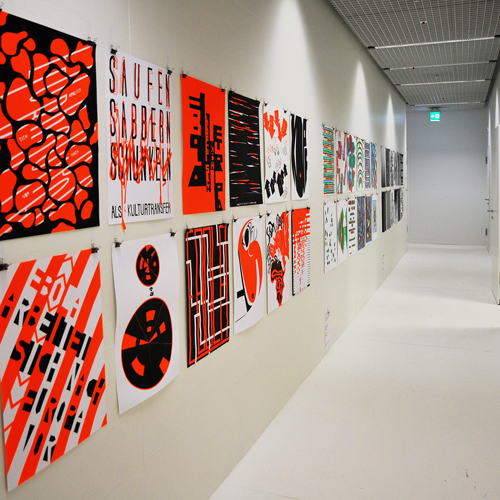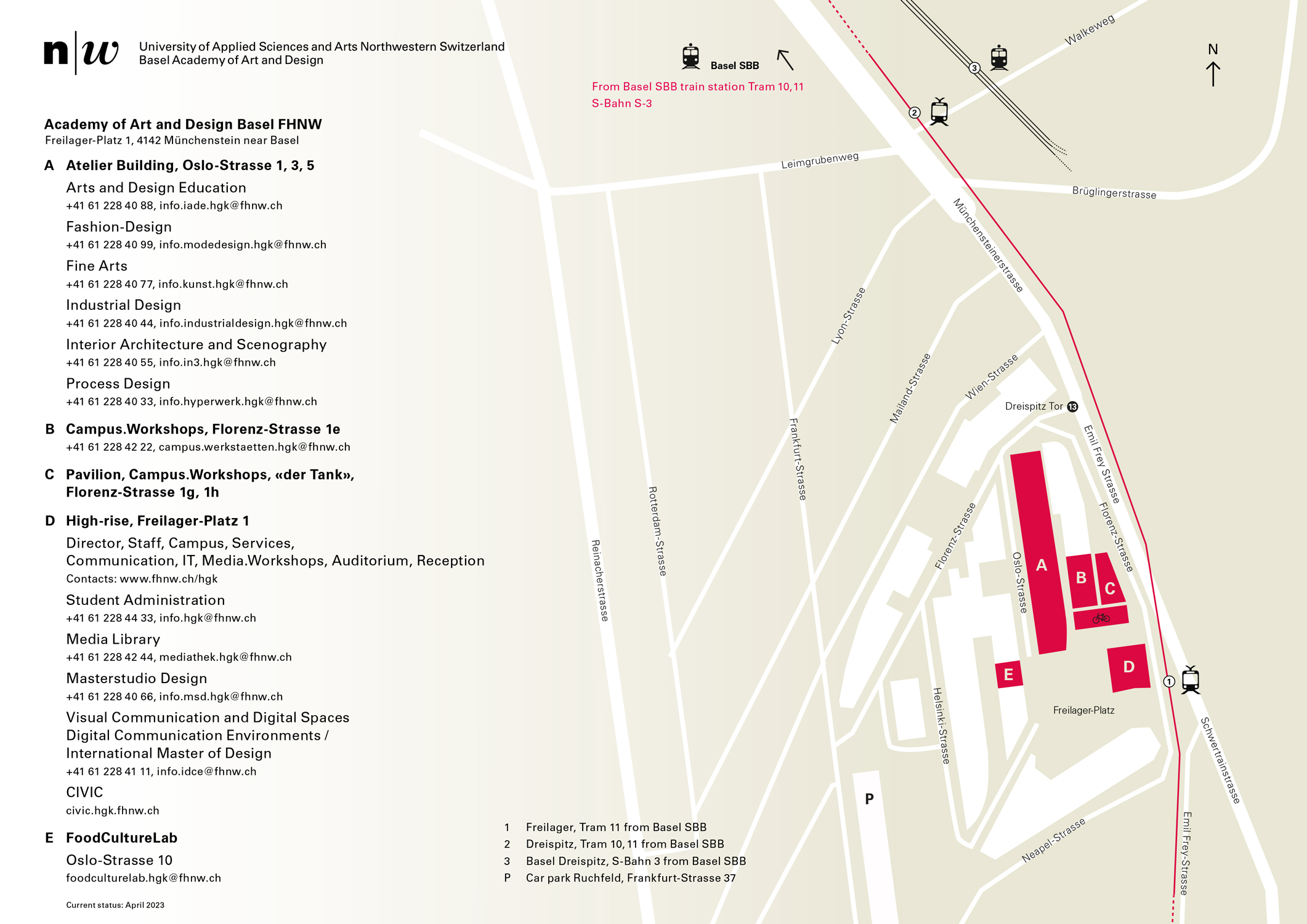Digital Communication Environments MA
The programme enables students to enhance their skills in the areas of design practices, technical knowledge, research methods and theoretical knowledge in the context of digital communication channels.
Key data
- Studying type
- Master of Arts FHNW
- ECTS points
- 120
- Study start
- September (week 38)
- Next start
- Mon. 14.09.2026 | Fall Semester
- Final application date
- Sun, 15.03.2026
- Studying mode
- Fulltime
- Duration
- 4 Semester
- Teaching language
- English (B2 level or equivalent)
- Place
- Basel
- Stay abroad
- Possible
- Application fee
- CHF 200.- (incl. aptitude assessment and enrolment)
- Semester fee
- CHF 750 (CH); CHF 1.000 (EU); CHF 1.250 (Not-EU/EFTA) Fees detail
Application for the Master's programme Digital Communication Environments.
Mobile navi goes here!
Information on programme contents
This master’s programme offers three areas in which the students can enhance their skills over the course of four semesters: 1. Expanding the experimental and reflective design practice of visual messages for analogue and digital communication environments, 2. Getting acquainted with research methods from design-oriented research and experimental exploration of new technologies to empirical evaluation of visual messages, 3. Getting an overview of relevant positions in visual, media and communication theory as well as philosophy, anthropology and psychology in order to critically put design decisions, concepts and research questions into context. On the basis of a practical foundation in a design-oriented bachelor’s study programme or a theory-oriented bachelor’s degree in cultural studies, the main goal of the study programme is a complementary fusion of skills between design and communication practice, research and theory.
Study structure
All students engage with the fields of design practice, practice-based research, and theoretical reflection across the first three semesters. The following fourth semester is the thesis semester. Through working together throughout their studies, the students, who come from different educational and cultural backgrounds, gradually acquire a combined set of practical, research, and theoretical communication skills.
Immersions
Over three semesters, all students immerse themselves in the main modules: Design Practice, Practice-based Research and Theoretical Reflection. The fourth semester is dedicated to writing the thesis. In a wide range of elective modules (in the areas of technology, practice, research or theory), a customised study programme can be put together that can be heavily guided by a specific project idea. By collaborating with students from a variety of academic and cultural backgrounds, students achieve a combination of practical, research and theory-based communication skills over the course of the programme.
Modules
Design practice
Students work on complex issues related to the design of digital communication environments, further develop their design method and improve their technical skills for the experimental exploration of digital channels. In the Authorship (1st semester), The Archive (2nd semester) and Interdisciplinary Focus (3rd semester) modules, you will improve your knowledge of and experience with design processes. You will further develop your language skills by talking about design processes in project teams with other students and in presentations.
Practically oriented research
In the Design Research (1st semester), Inquiry into Future Technologies (2nd semester) and Empirical Evaluations (3rd semester) modules, you will get to know different practically oriented research methods that can be used to scientifically back decisions in the field of communication. You will learn how questions of Visual and Media Science, Science and Technology Studies or Social Sciences can be combined with practically oriented methods. Knowing the state of the art of a research question puts you in a position to define and work on your own research approach. In the research module, practical, technological and theoretical areas of knowledge are brought together.
Theoretical fields of knowledge
In the Visual and Media History (1st semester), Theories of the Digital (2nd semester) and Critical Theory (3rd semester) modules, you will improve your conceptual and strategic knowledge in the field of communication in digital environments. Acquiring knowledge about the theory and practice of visual communication and current technological developments as well as about related fields of knowledge helps students formulate their own practice-based research questions. The examination of theoretical fields of knowledge is a foundation for describing the state of the art of a knowledge area and articulating open-ended questions.
The Digital Communication Environments master’s programme is geared towards students who already have a bachelor’s degree from an art or design university (e.g. Visual Communication, Communication Design, Media Design, Graphic Design, Photography) or a bachelor’s in a cultural studies field (e.g. Art History, Media Science). The objective consists of combining design practices in digital communication environments with practically oriented research approaches and theories in the field of Visual and Media Studies. It is the only Master of Arts in the design field in Switzerland that has 120 ECTS credits and thus meets the formal requirements for a PhD.
Goals and benefits
The master’s programme prepares students to confront current communication challenges. The diversity of our society and, by extension, the diversity of perspectives it contains must be met with a diversity of voices in our visual messages. The fast pace of technological development offers new opportunities, but also requires critical questioning. Through the experimental use and development of new technological achievements, models can be developed that critically demonstrate their defined purpose or their deviation from it. The standardisation and omnipresence of digital tools and the flattening of visual expression that goes along with it requires new abilities to overcome the imposed restrictions and to understand communication as a culturally shaped phenomenon.
Career prospects
The master’s programme imparts the autonomy needed to be as prepared as possible for future challenges in communications-related, creative, medial, teaching and researching fields of work. The graduates have advanced specialist skills in order to establish themselves in leading positions of the communication industry (offices for visual communication, corporate communication, communication agencies, media agencies, publishing houses, journalism, TV, in-house communication teams, etc.). Other graduates establish themselves in research and teaching or in cultural entrepreneurship. They also have the necessary methodological skills to reflect on and further develop their own working methods within the context of social and technological change.
With its studios, labs and central Campus.Workshops, the HGK provides an ideal environment for bringing together a curiosity for craftsmanship and a desire to learn technical skills and gain digital know-how. What’s more, all students have 24/7 access to their own workplace in the spacious studios.
Information on admission, aptitude assessment and admission to the study programme
Academical qualifications
Admission to the aptitude assessment for the Master’s degree programme normally requires one of the following qualifications:
- A Bachelor’s degree in Design (Visual Communication) or a related field of study.
- A similar, equivalent degree in Design (at BA level pursuant to the “Dublin Descriptors").
If an applicant shows promising design potential, lateral entry from a different discipline is possible; in this case, please contact the Head of the degree programme.
Language of tuition
International students are welcome to apply for the Master’s degree programme. The language of tuition is English (B2 level or equivalent).
To apply for a place at the HGK Basel, the required documents must be submitted by deadline 15.03.2026.
Please send the specific enquiries to email address.
Dates 2026
- 01.11.2025
Publication of the detailed information on the aptitude assessment - 15.03.2026
Registration deadline and deadline for submitting the required documents for the aptitude assessment. - 31.08. - 11.09.2026
Introductory weeks at the HGK Basel (mandatory) - 14.09.2026
Fall Semester begin 2026/27
Here you will find answers to FAQs about preparing and registering for a Bachelor’s (BA) or a Master’s (MA) degree programme at the HGK Basel FHNW.
Here you will find answers to organizational, administrative and legal questions all about studying -->
Further Information Digital Communication Environments MA
The MA programme builds on a close collaboration with a number of partner institutions across the globe, all of them involved in technology-based visual and media research. Concrete projects are in place, for example, with the University of Art and Design Linz; the Royal Danish Academy of Fine Arts: Schools of Architecture, Design and Conservation; the University of Illinois Chicago; the University of Cincinnati; the Rhode Island School of Design; the Indian National Institute of Design NID; the Politecnico Milano; the National Taiwan Normal University NTNU; the Politechnic University Hong Kong; and Hongik University Seoul Korea.
International students can find further information on the website of the International Office of the HGK Basel.

Public transport
The campus is easy to reach by public transport. The stop Freilager on BLT line 11 is immediately in front of the Campus (from Bahnhof SBB in direction Aesch)
By car
Leave the motorway A2 at the junction Basel-St. Jakob and follow the sign Dreispitz. Approaching from Münchensteinerstrasse enter the Dreispitz complex through Gate 13 and park your car in one of the public car parks (Ruchfeld or Leimgrube). When setting your satnav, please note that the Freilager complex is part of the municipality of Münchenstein, Canton Basel-Landschaft.
Access by car for people with disabilities
Choose the access via Florenz-Strasse in the direction of the High-rise building (Building D). To lower the bollard at the gates of the campus please ring the bell. You will be connected to our reception in Building D.

The buildings of the HGK Basel are accessible by wheelchair, stroller, and for people with walking difficulties. The entrance to the highrise building (Building D) is at ground level, the studio building (Building A) can be reached via a ramp. There is at least one lift in both buildings.
Access by car for people with disabilities: See Gender-neutral toilets: See ‘Getting there‘.
Toilets for people with disabilities:
Highrise building (Building D): Ground floor to 8th floor in the centre of the building
Studio building (Building A): Ground floor to 3rd floor, southern section of main corridor
Gender-neutral toilets: See ‘All Welcome WC’.
Parent-child-room: See 'Parent-child-room'.
Basel Academy of Art and Design FHNW
Institute Digital Communication Environments (IDCE)
Postfach
(P.O. Box)
CH-4002 Basel
Basel Academy of Art and Design FHNW
Institute Digital Communication Environments (IDCE)
Freilager-Platz 1, Tower: D 5.03
4142 Münchenstein / Basel
Phone: +41 61 228 41 11
Fax: +41 61 228 42 89
M info.idce.hgk@fhnw.ch

